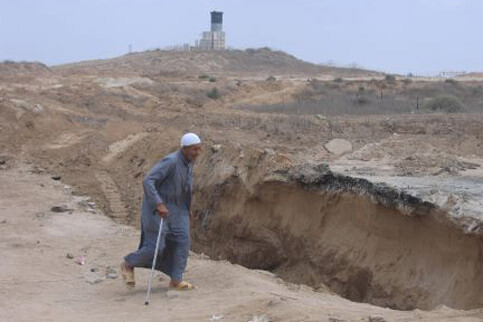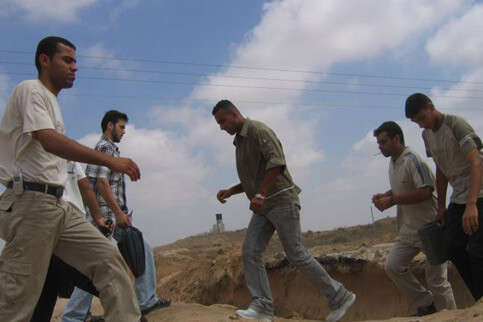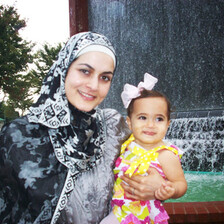
An elderly man at Netzarim checkpoint. (Laila El-Haddad)
I spent much of the day talking to Palestinians trying to cross the Netzarim checkpoint today. It is a 6m deep trench dug deep into Gaza’s coastal road, which has in recent days been ripped apart by nocturnal armoured bulldozers that come out from behind the lone sniper in he distance, and dissappear before dawn when their work is done.
The checkpoint, along with one further south at Abo Holi, has divided Gaza into three isolated segments for over five days now: Rafah and Khan Yunis in the south; dair al-Balah, Maghazi, and Nseirat refugee camps in the central Gaza Strip; and Gaza city, Beit Hanun, and Jabaliya in the north.
It was a painful site, as I heard testimony after testimony of the hardship endured in what would otherwise be a daily routine. Commerical trucks, donkey carts, fruit vendors, taxis, all attempting to make it down the trench and across to the other side. Young women heading to college carrying textbooks, walking over 3 km around the checkpoint; Women with infants; Elderly Palestinians trudging across on canes through mounds of sand; And most heartbreaking of a all, a man who was suffering from Parkinson’s, and had come back from al-Shifa hospital with a bag full of medicine and a medical transfer to Egypt, though he would be unable to travel there because further south, Abo Holi checkpoint was completey sealed off to commuters.
I heard accounts of “close-calls”, of bullets just missing commuters heads, fired in “warning” by the lone sniper overlooking the checkpoint, and when it was over, I headed home, relieved that none of those bullets had been fatal, satisfied with a job well-done, and wrote the story out.
I made it home in time to meet with a colleague from the BBC who was here on assigment for a radio program. “I just heard a 14-year-old boy was shot at Abo Holi, but the IDF hasn’t yet confirmed it,” she said.
I checked my sources. I called the hospitals, the families in Dair al-Balah, and sure enough, 14-year old Raghed al-Masri was brutally {blocked}ed, as he was waiting with his family in a taxi at Abo Holi. But the world’s media was too busy covering a press conference Abbas was holding in Gaza, and a meeting between Hamas and Egyptian delegates on the fate of he dubious “ceasefire”.

A 6m deep trench dug deep into Gaza’s coastal road, which has in recent days been ripped apart by nocturnal armoured bulldozers. (Laila El-Haddad)
I immediately called an Israeil Army spokesperson for an explanation. He dodged my phone calls until late in the night, only to tell me the matter was “under investigation”.
“All we know is that Palestinian cars attempted cross the checkpoint by force, so the soldiers fired warning shots into the air, not at the cars, and we have not received word of any injuries-there wasn’t even an ambulance there.”
Suddenly, all I could think about was Tom Hurndall. And Rachel. Iman al-Hams. And young Nouran Deeb. And her mother’s tears. and her father’s silent anguish. And the lies. the terrible lies.
The doctor who examined Ragheb’s body said the bullet hit him in the back and came out through his chest, tearing his fragile heart apart. In other words, there is no chance this bullet was fired into “open air”.
Now I think to myself as I head to bed, having just submited a news story on the tragic incident, after rewriting my initial story that merely talked about the closure’s impact (how could I have known the impact would be so deadly?), I feel a sense of emptiness inside.
I compiled the facts and snapped he photos and wrote them out, nicely arranged, on a page, on a site, that soon, will be forgotten. Along with Ragheb. Along with all the innocent angels that have fallen. And I think to myself, when will it end?
Leila M. El-Haddad is a journalist based in the Gaza Strip.
Related Links





